Final report for SVA17-001
Project Information
The College of Agriculture and Life Sciences at Virginia Tech and the School of Agriculture at Virginia State University are strongly committed to the objectives of the SARE Professional Development Program. Virginia Tech and Virginia State University continue to host and sponsor professional development workshops and programs each year. These workshops and programs help build interest and strengthen the implementation of sustainable methods, practices, and research across Virginia, especially in the areas of ecological soil management, cover cropping, community food systems, and overall market diversification for meat, milk, vegetable and fruit producers. There is strong consumer interest in how food is produced and where food comes from. Additionally, there is more interest in community, local, and regional food systems that encourage more community-focused farm-to-market and value chain connections, which can strengthen and foster sustainable agriculture and food systems efforts. Virginia Cooperative Extension, through our SARE initiatives, organizational partnerships, and professional development program, seeks to serve all of agriculture and fully integrate sustainable farming practices that emphasize the social, economic and environmental components of sustainability throughout the food system. We continue to provide the most current and best scientific information and research so producers and citizens can make choices which best suit their individual and community objectives.
1) Annually conduct training regarding sustainable agricultural practices and Southern Region SARE programs on a statewide basis and in conjunction with other planned agent and partnering agencies' (NRCS, FSA, SWCD, Farm Credit) existing training programs to reach the following:
• One hundred twenty Agriculture Extension Agents (VCE)
• Twenty Farm Service Agency (FSA) personnel and Farm Credit system personnel
• Eighty Natural Resource Conservation Service (NRCS) and Soil and Water Conservation District (SWCD) personnel
2) Annually conduct train-the-trainer training on a statewide basis and in conjunction within existing annual conferences and/or field meetings to reach at least 300 persons including farmer, military veterans, landowners, farming associations, state government agency personnel, county government personnel, non-government organizations (NGO's) and community-based organizations (CBOs).
3) Annually conduct training with at least 75 socially disadvantaged farmers, landowners and community leaders, including military veterans, African-Americans, Hispanics, Asians, Native Americans, women, and persons who have limited resources of land, labor, and capital regarding sustainable agriculture practices and Southern Region SARE programs.
Although farms and farm communities face many social, economic, and environmental challenges, Virginia is rather fortunate to have 44,300 farms and more than 8.1 million acres of farmland (U.S. Department of Agriculture’s 2017 Census of Agriculture). These farms are not one-size-fits-all but uniquely different based on location, physiography, resources, size, history, and values. Virginia SARE, in collaboration Virginia Tech and Virginia State University, works to leverage agricultural, community, and organizational partnerships in education and research to develop place and values-based food systems, which are embedded with and founded on core sustainable agricultural principles and values, across Virginia to serve farms of all sizes. Virginia SARE and its educational partners realize farmers of all sizes are finding common ground around sustainable agriculture topics and their mutual interest in soil health, cover cropping, farm-to-table connections, and community health. Within this context, Virginia’s 2017 – 2018 Model State Program and its professional development programming focused on peer-to-peer learning and training for Extension educators, USDA professionals, and mentor farmer-leaders to encourage implementation of core sustainability principles and practices such as soil health management, diverse cover cropping systems and market channels, community-focused food and farm connections that can also strengthen community resilience and Virginia’s food systems. In 2017– 2018, Virginia SARE supported and encouraged participation of USDA and Extension personnel and farmer mentor-leaders in the 2017 Virginia Farm to Table Conference, Virginia Association for Biological Farming’s 2018 Annual Conference, the Mid-Atlantic Fruit and Vegetable Conference, networking and finding common ground around sustainability, farm viability, conservation, and community health were important facets of all of these training programs. Additionally, Virginia SARE has made a concerted effort to improve coordination and marketing of educational programs across the state through a Google calendar that is shared with updates on a weekly basis to Virginia Tech and Virginia State University sites, and Virginia SARE's Facebook page with targeted tagging of pertinent community partners. The intended audience for Virginia’s 2017 – 2018 Model State Plan of Work was Extension and USDA professionals (i.e., Natural Resources Conservation Service, Farm Service Agency, Rural Development, Farm Credit, and Soil and Water Conservation Districts, Forestry etc.), and mentor farmer-leaders working on sustainable agriculture, resource conservation, community, local and regional food systems, and community economic development issues.
Advisors
- (Educator)
- (Educator)
- (Educator and Researcher)
- (Educator and Researcher)
- (Educator)
- (Educator)
- (Educator)
- (Educator)
- (Educator)
- (Educator)
- (Educator)
Education
Virginia SARE utilizes a collaborative train-the-trainer participatory-based approach to build the educational and instructional capacity of Extension and USDA professionals and mentor farmer leaders to address current and emerging sustainable agriculture-related issues. This approach includes direct instruction, peer-to-peer learning, networking, farmer case studies, in-field demonstrations, and social marketing. Additionally, members of the Virginia SARE Advisory Committee work collaboratively with other organizations and conference planning committees to influence and shape the training agendas of workshops, field days, and applicable conferences. Virginia SARE focuses on key topics such as soil health, reduced tillage, cover cropping, crop diversification, sustainable business planning, direct and intermediate market channels, community-focused food systems, grazing, systems-thinking and leadership, and efforts to enhance the resilience of crop and livestock systems for the benefit of farms and communities. We continually seek to leverage resources, be opportunistic with emerging educational and research opportunities, piggyback pieces of training when practical and feasible, and collaborate to meet the state’s educational programming goals. Within this context, Virginia SARE has worked to improve communication and coordination of applicable educational events with the enhanced use of a shared Google calendar accessible to trainers, researchers, and producers across organizations and universities.
Education & Outreach Initiatives
To train Extension, USDA-NRCS, Soil and Water Conservation Districts, and mentor farmers about soil health, cover cropping systems, and farm-to-table connections as a means for finding and building common ground for innovative partnerships to expand the educational outreach of core sustainable agriculture principles.
Virginia’s Sustainable Agriculture Research and Education (SARE) Program continues to emphasize peer-to-peer learning and training around soil health, cover cropping systems, and farm-to-table connections to find and build common ground around key sustainable agriculture principles and practices. The Virginia SARE Advisory Committee realizes Virginia has made significant progress in promoting and raising awareness around soil health and cover cropping but Virginia SARE still needs to focus on train-the-trainer experiences and building the capacity of trainers more intensively and extensively. The goal would be to encourage innovative partnerships and expand the educational outreach of key sustainable agriculture principles through ongoing training around common themes. In 2017 – 2018, Virginia SARE provided professional development training related to soil health and cover cropping systems for Extension educators, USDA professionals, and mentor farmer-leaders by providing travel scholarships and conference registration support to the 2017 Virginia Farm to Table Conference, the 2018 Virginia Association for Biological Farming Conference, and the Mid-Atlantic Fruit and Vegetable Conference.
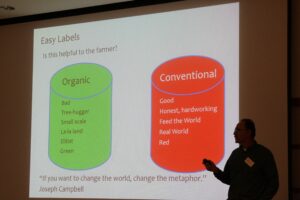
Virginia participants received 24 hours of professional development related to soil health and cover crops. New networks and relationships were strengthened through conversations at the conference workshops. Similarly, Virginia SARE helped to shape the Voices from the Field and Practical Applications of Soil Health tracks offered at the 2017 Virginia Farm-to-Table Conference and provided educational support so 42 educators and practitioners could learn from featured speakers such as Dr. Robin 'Buz' Kloot of the University of South Carolina's School of Public Health who shared Five Big Soil Ideas in 60 Minutes and Questioning the Organic/ Conventional Dichotomy. Additionally, people learned from mentor farmers Danny Boyer of the Blue Ridge Plateau Initiative, J.P. Pall of Glade Road Growing, and Amanda and Buck Holsinger of Holsinger Homeplace Farms.

Virginia SARE exhibited at the December 2017 Farm to Table Conference. Over 100 attendees visited the exhibit and took SARE jump drives full of the SARE resource books and bulletins home. The SARE publications were discussed and were of great interest to producers in attendance. Eighty copies of SARE publication, Building Soils for Better Crops, were provided to Virginia Cooperative Extension Agents, NRSC agents, and other trainers in attendance as their primary reference on soil health.
Another key training venue for educators and champions of soil health and cover cropping systems was the Virginia Association for Biological Farming’s 2018 Annual Conference and the Mid-Atlantic Fruit and Vegetable Conference. Six agents and the SARE Program Assistant attended the Mid-Atlantic Fruit and Vegetable Conference. Four were sponsored by SARE. Virginia SARE recognizes a need to bring research-based education to the forefront in sustainable agriculture programs offered across Virginia. Many of our farmers are vegetable and small fruit producers and are struggling to put together the right combination of tools to grow a quality crop. Researchers at this conference share organic production tools that aid in producing a quality product. Next year, we hope to encourage more producers to attend this conference. The thought is to pair an agent with a producer and provide a scholarship to defray the registration cost. Participants learned about soil health and organic production of fruits and vegetables under high and low tunnel situations.
Virginia SARE provided 24 hours of professional development training in the areas of soil health and cover cropping to 232 Extension educators, USDA professionals, and mentor farmer-leaders in 2017 – 2018. Similarly, Virginia SARE by shaping the agendas for the 2017 Virginia Farm to Table Conference and 2018 Virginia Association for Biological Farming Annual Conference over 575 participants at these conferences learned about core soil health principles through general and concurrent sessions. Another outcome of ongoing educational programming to find and build common ground is that Virginia now has an identified cadre of 150 soil health and cover crop educators and champions who want to continue to work and learn together. To improve communication and coordination as more of a learning and demonstration network, Virginia (c/o Dr. Wade Thomason et al.) submitted a proposal to Southern SARE and was awarded funding to support two-years of professional development to formalize and build the capacity of this fledgling network so the peer-to-peer knowledge and experiences can be shared across the state and region.
A third outcome is that Drs. Elsa Sanchez and Beth Gugino of Penn State will be trainers at the 2018 Virginia Farm to Table Conference on organic production under greenhouses and high tunnels.
To improve communication and raise awareness of ongoing sustainable agriculture-related research and educational events across Virginia.
Virginia has two land-grant universities, Virginia Tech and Virginia State with faculty and students that work on sustainable agriculture education and related projects through Virginia Cooperative Extension. We also have numerous partnering organizations that offer educational programming in areas related to sustainable agriculture and environmental quality. At times, it seems that the right-hand does not know what the left is doing and our reach to farmers across the State seems limited. The Virginia SARE Advisory Committee has made a concerted effort to improve communication and raise awareness of ongoing sustainable agriculture-related research activities and educational events across Virginia. The Advisory Committee suggested a calendar be created to promote and reflect agriculture programming across the State offered by Virginia SARE or in partnership with Virginia Cooperative Extension and its partners. A Google calendar of programs was created and is sent weekly to Agriculture and Natural Resources Extension Agents, and county office administrative assistants across the State, as well as shared on the Virginia SARE Facebook page. Virginia State University maintains an agriculture calendar and the information is also posted on the Virginia Tech College of Agriculture and Life Sciences (CALS) Calendar that appears on the CALS Homepage. Below is a sample of the events shared electronically through Google groups and social media sites.

Virginia SARE also communicated with recent grant recipients to see how we can assist in promoting their research and educational events. Virginia Tech and Virginia State University also want to make sure their faculty and students are aware of existing grant opportunities through SARE and are actively pursuing applicable grant programs. The Universities also want to ensure Virginia farmers and communities are actively engaged in potential grant programs as well and the opportunities are being leveraged when possible.
The Virginia SARE Calendar as a communication effort was started in February 2018. Interest in the calendar is growing. Some agents told Cyndi Marston that attendance in their programs has increased due to the calendar. More agents are participating in adding information to the calendar. Agriculture Extension Specialists email weekly and thank SARE for producing the calendar, explaining that it is very helpful. When the calendar is posted on the Virginia SARE Facebook page, it is linked to organizations that are connected to the programming if at all possible. For example, when an educational program on cattle is offered, the Virginia Cattlemen’s Association will be tagged. The program offered is often picked up and shared by the organization, thereby increasing our outreach and visibility to producers.
SARE grant recipients reported 158 consultations with producers, 15 field days, 8 farm tours, 14 on-farm demonstrations and 3 publications. 514 producers have participated in the grants and 474 agriculture professionals have participated field days and educational outreach efforts. 317 participants have reported a knowledge change as a result of participating in the grants and 15 have reported changes in behavior as a result.
To provide interdisciplinary food system training to Extension and USDA personnel and cultivate conversations about the importance of health, wealth, sustainability, and equity in the food system.
To cultivate conversations about health, wealth, sustainability, and equity in the food system through better farm to table connections, the 2017 Virginia Farm to Table Conference featured speakers Diane Imrie, director of nutrition services, University of Vermont Medical Center; Jack and Anne Lazor, of Butterworks Farm; Elnian Gilbert, of ZingTrain and Zingerman’s Community of Businesses; Shorlette Ammons, of North Carolina State University’s Center for Environmental Farming Systems; Tim Woods, of the University of Kentucky; Andrew Mefferd, of Growing for Market and author of the Greenhouse and Hoophouse Handbook; Robin ‘Buz’ Kloot, of the University of South Carolina’s Arnold School of Public Health; and other panelists. The two-day conference was attended by 205 people on Day 1 and 190 on Day 2. The conference provided interdisciplinary food system-related training to 42 Extension and USDA-NRCS professionals and 56 representatives from non-profit organizations and state agencies. Participants were able to attend five different concurrent tracks where the topics covered ranged from technical and experiential tips for sustainable agriculture production and market development to inspiring stories of regional cooperation for food justice and equity. The educational event provided three hours of in-depth training on market readiness to 12 Extension educators, USDA personnel, lending officers, and farmer mentor-leaders at the Virginia Farm-to-Table Conference. For people interested farm-to-hospital initiatives, Diane Imrie of the University of Vermont Health System provided 3-hours of training and sharing of her experience.
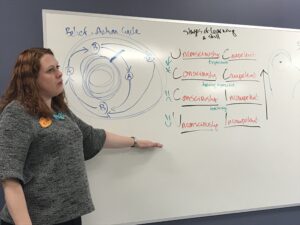
As an example, Elnian Gilbert, of Zingtrain and Zingerman’s Community of Businesses, offered multiple sessions on visioning and the art of giving great service for hospitality, community, and agricultural service providers. Relevant across industries, these sessions discussed the importance of better serving customers, clients, and colleagues by incorporating the art of giving great service principles into the culture of the organization. Several USDA-NRCS personnel shared how insightful the visioning and customer service principles on a personal and professional level and how they plan to incorporate the training into their work environment.
Gaining leverage and retaining a position in intermediated market channels such as restaurants, specialty retail stores, and grocery stores continues to be a challenge for Virginia's small and mid-sized farms and food entrepreneurs, Tim Woods of the University of Kentucky specifically provided instruction on ways to enhance market readiness and growing your niche in the marketplace.
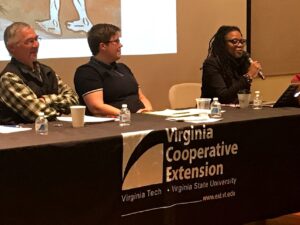
Shorlette Ammons of North Carolina's Center for Environmental Farming Systems shared her work experience in addressing equity and racial justice in the food system and how to engage diverse audiences and peoples of color as part of food system planning training. Andrew Mefferd of Growing for Market and author of the Greenhouse and Hoophouse Handbook provided three hours of training on season extension and greenhouse production at the conference and additional 6 hours as part of a post-conference community workshop for farmers to go deeper on the topic. Other conference instruction included discussion on the Future of the Agricultural Workforce, Fostering Hope Together, Scaling Up, and Online and Electronic Resources.
Another key component of the professional development training was on farm-to-school and farm-to-university initiatives to work at organizational and behavioral change at an institutional level. As part of this effort, Virginia SARE partnered with Harrisonburg City Public Schools to have their Mobile Cafe available for a tour in the late afternoon and evening.
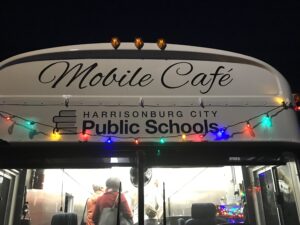
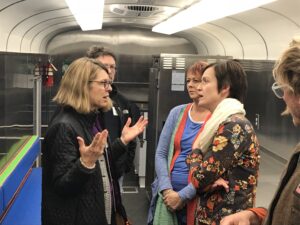
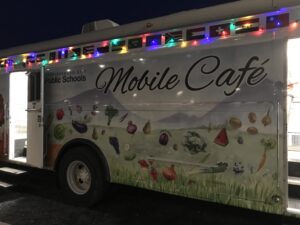
In January 2018, the Virginia Association for Biological Farming (VABF) put on the 19th annual Virginia Biological Farming Conference at the Homestead Resort in Hot Springs, Virginia. Participation for the winter gathering totaled nearly 400 attendees with 46 exhibitors and staff as well as our 14 conference sponsors and was a huge success. Pre-conference workshops were extremely popular this year, with 82 attendees spread between the 5 sessions offered.
Virginia SARE manned an exhibit at the Virginia Biological Farming Association’s Annual Conference in January. Over a two-day period, the SARE exhibit was visited by over 200 people. SARE resources were shared with farmers and with those who work with farmers. The exhibit started conversations about soil health and farmer/public education about soil and water. A large percentage of the producers visiting the booth were in their twenties and thirties. As part of this conference, Cyndi Marston Virginia SARE's Education Support Specialist and State Program Assistant spent a day with women producers and heard them express the need for an educational setting apart from men to be taught topics like basic farm mechanics, tractor safety, trailer hauling, cattle working, etc. SARE shared these insights and sentiments with Extension agents and a Women in Agriculture Gathering that was held in March.
The planning committee received extremely positive feedback on the visioning and service training provided at the conference. Ellen Polishuk, an ecological farmer and agricultural consultant formerly of Potomac Vegetable Farms, shared that she signed up for an additional ZingTrain workshop in Ann Arbor as a result of the training she received at the farm-to-table conference. Many Extension and USDA-NRCS colleagues also commented how valuable the training on visioning and service was to them. USDA-NRCS personnel shared how insightful the visioning and customer service principles on a personal and professional level and how they planned to incorporate the training into their work environment.
Educational & Outreach Activities
Participation summary:
Learning Outcomes
Project Outcomes
Virginia SARE continues to emphasize and incorporate principles of systems thinking and leadership, resilience, and network analysis, along with core sustainable agriculture practices, into train-the-trainer events and training. Extension and USDA professionals were particularly pleased with new information on visioning and customer service as a means for expanding sustainable agriculture outreach and improving their own training skills.
Virginia SARE continues to emphasize and incorporate principles of systems thinking and leadership, resilience, and network analysis, along with core sustainable agriculture practices, into train-the-trainer events and training. Extension and USDA professionals were particularly pleased with new information on visioning and customer service shared in 2017 PDP programming, specifically by ZingTrain, as a means for expanding sustainable agriculture outreach and improving their own training skills.
Face of SARE
Virginia’s SARE program focuses its outreach and promotional efforts to increase SARE’s public presence at events and conferences such as Virginia Association for Biological Farming, VCE's Annual Winter Professional Development Conference, and the University of Virginia's Sustainability Expo; regularly update the Southern SARE web page with content from Virginia, and increase its online and social media presence through Facebook; and to contribute to blog sites and topic pages hosted by Extension. Collaboration and coordination with partner organizations continue to be important focuses for Virginia’s professional development training opportunities so resources can be leveraged and pieces of training piggybacked where and whenever possible. Virginia SARE is more intentional to address equity, fairness, and justice in relation to sustainable agriculture and resilient food systems training and professional development programming.